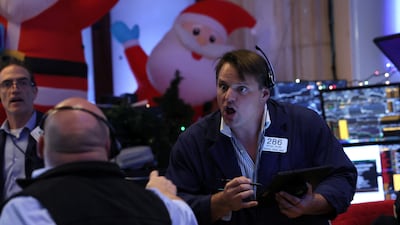Wall Street trading was muted on Friday, but it was enough for its longest winning streak in six years as the Dow Jones Industrial Average extended its record run.
Global equities, however, were unable to sustain the momentum from a rally on Thursday, as investors had to digest comments from the US Federal Reserve on the future of interest rates.
Markets responded favourably after the Federal Reserve signalled it could cut interest rates several times in 2024, but Fed chairman Jerome Powell sought to balance that optimism with a more cautious tone after suggesting rates have reached their peak.
The Fed ended its final policy meeting of the year by leaving interest rates unchanged at 5.4 per cent – their highest level in 22 years. By aggressively raising rates, the central bank has sought to address inflation, which had climbed to 9.1 per cent last year.
“As we approach the end of the year, it's natural to look back on the progress toward our dual mandate objectives,” Mr Powell told reporters, referring to price stability and full employment.
His remarks followed a statement from the Federal Open Market Committee, which for the first time in its tightening cycle said that inflation has “eased over the past year” with the caveat that it still remains above the Fed's 2 per cent goal.
Other major central banks were more hushed. Christine Lagarde and Andrew Bailey, the heads of the European Central Bank and the Bank of England, respectively, would not be swayed into the Fed's thinking, for now.
“There’s a high likelihood that after 10 rate increases we’ve reached the interest rate plateau,” ECB Governing Council member Joachim Nagel said on Friday in an interview with German broadcaster ZDF.
“In my view, it’s much too early to think about when rate cuts might possibly happen.”
On Wall Street, the S&P 500 settled less than 0.1 per cent lower, but still notched its seventh winning week and a row and its best show since 2017.
It is within 1.6 per cent of its record high set in early 2022.
The Dow, which passed the 37,000-point mark for the first time this week, rose 0.2 per cent, to settle at 37,305.16, a third straight record finish. The tech-heavy Nasdaq Composite was up 0.4 per cent.
In Europe, London's FTSE 100 settled 1 per cent lower, but was able to eke out some gains for the week, underpinned by strength in pharmaceutical and biotechnology stocks.
Frankfurt's Dax declined 0.1 per cent, while Paris' CAC 40 rose by 0.4 per cent.
Earlier in Asia, markets tracked Wall Street, with Hong Kong's Hang Seng index surging 2.4 per cent at the close, and Tokyo's Nikkei 225 adding 0.9 per cent.
The Shanghai Composite, however, dropped 0.6 per cent, despite reports that China had injected more cash than expected into its financial system.
In commodities, oil prices ended lower after an up-and-down trading session, as investors continue to weigh demand concerns and the extended output cuts from Opec+ members.
Brent inched down 0.08 per cent to settle at $76.55 a barrel, while West Texas Intermediate shed 0.21 per cent at finish at $71.43 a barrel.
Gold, meanwhile, posted a weekly gain on the Fed's more dovish stance on interest rates. The precious metal shed about 0.5 per cent, or $9.20, to settle at $2,035.70 an ounce.


